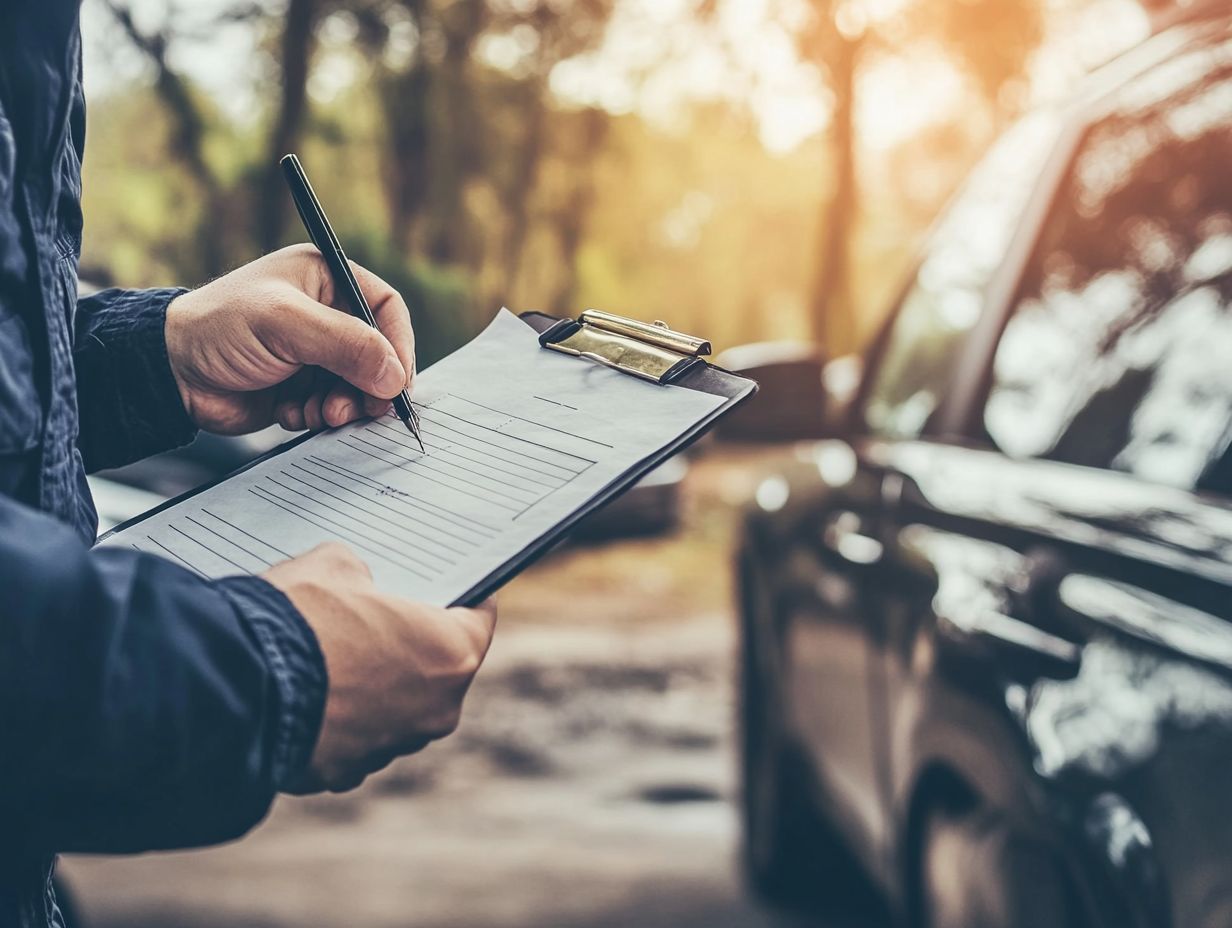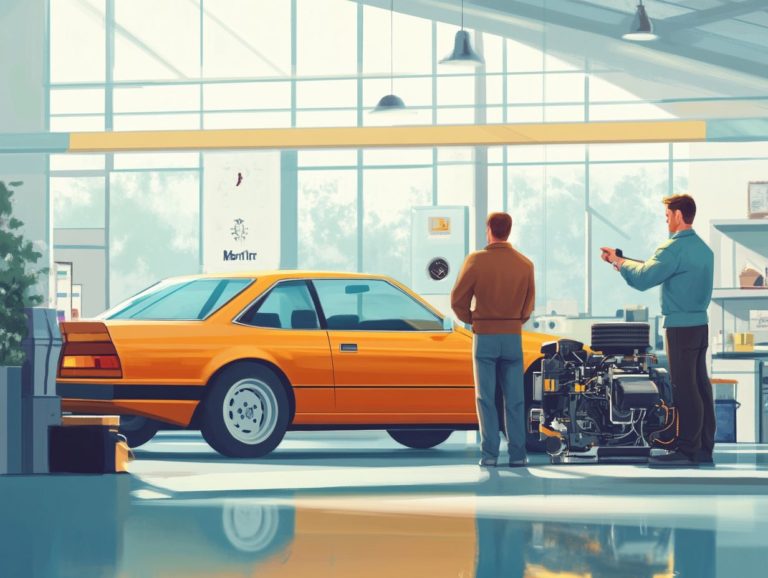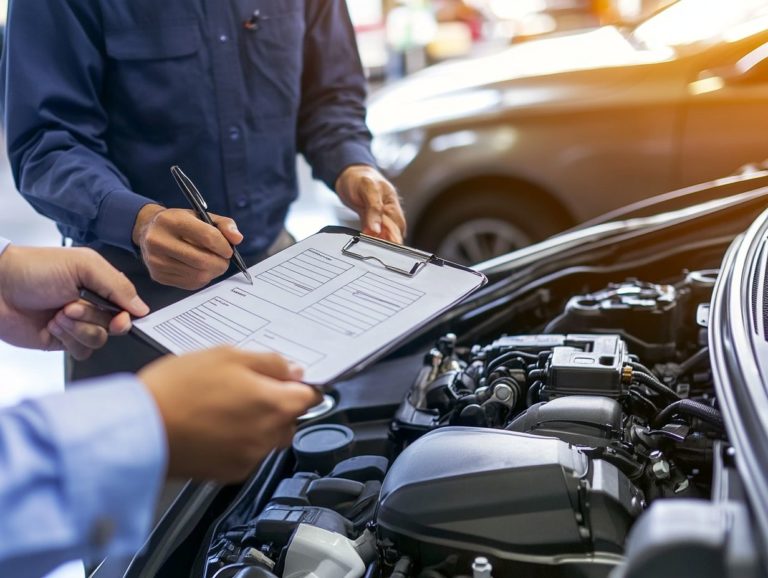How to Prepare for Buying a Used Car
Purchasing a used car can evoke a mix of excitement and apprehension. With an overwhelming array of choices at your fingertips, understanding where to begin is essential. Equip yourself with the right tools and knowledge. Dive into your purchase with confidence! Let s get started on finding your perfect used car!
This guide serves as your roadmap, leading you through crucial steps from conducting thorough research and setting a clear budget for buying and owning the vehicle to pinpointing potential red flags during inspections. It also highlights the importance of test driving, securing a comprehensive vehicle history report, and mastering effective negotiation tactics to ensure you secure the best possible deal.
Contents
- Key Takeaways:
- Researching and Setting a Budget
- Inspecting the Car’s Exterior and Interior
- Test Driving and Evaluating Performance
- Obtaining a Vehicle History Report
- Negotiating and Finalizing the Purchase
- Frequently Asked Questions
- What should I consider when preparing to buy a used car?
- What documents do I need to prepare before buying a used car?
- How can I determine if a used car is in good condition?
- What should I know about the car’s history before buying a used car?
- What are some tips for negotiating the price of a used car?
- Should I test drive a used car before purchasing it?
Key Takeaways:

- Do thorough research and set a budget before buying a used car. Consider factors like the make, model, and condition of the car, and use tools like price comparison websites to help you make an informed decision.
- Inspect both the exterior and interior of the car for any red flags or warning signs. Look out for issues like rust, dents, and unusual smells, as these could indicate potential problems with the vehicle.
- Take the car for a test drive and pay attention to its performance. Look out for any strange noises or vibrations, and test the brakes and steering. This will help you determine if the car is in good working condition.
Researching and Setting a Budget
When you embark on the journey of purchasing a used car, it’s essential to begin with thorough research and set a clear budget that includes the initial purchase price and ongoing expenses like insurance and maintenance. Additionally, consider learning how to prepare for a car purchase negotiation to ensure you get the best deal possible.
Gaining a solid understanding of average used car prices will enable you to make informed decisions, whether you’re navigating dealerships or engaging with private sellers. By leveraging resources such as Kelley Blue Book and Consumer Reports, you can gain invaluable insights into fair pricing and vehicle history, ensuring your financial commitment aligns seamlessly with your needs and expectations.
Factors to Consider and Tools to Use
When researching a used car, several factors come into play, including the vehicle’s condition, previous owner information, and whether it qualifies as a certified pre-owned (CPO) vehicle, which has been inspected and comes with a warranty. Understanding these elements is crucial for making an informed decision, as they directly impact the longevity and reliability of the vehicle you’re considering.
Utilizing tools like Carfax and AutoCheck for vehicle history reports can help you uncover any past issues. Additionally, Edmunds offers valuable comparisons and insights on certified pre-owned vehicles, ensuring that you make a sound investment.
Inspecting the vehicle in person is crucial; keep an eye out for signs of wear, rust, or any unusual noises during a test drive. It’s also wise to consider the importance of test driving a used car and obtain an independent mechanic’s evaluation from an Automotive Service Excellence-certified shop to uncover any hidden mechanical problems. By gathering this information, you can feel more confident in your choice, especially with CPO vehicles, which often come with warranties and have undergone rigorous inspections, adding an extra layer of assurance.
Inspecting the Car’s Exterior and Interior
Inspecting both the exterior and interior of a used car is essential in your buying journey, as it reveals potential issues that could impact the vehicle’s performance and longevity. For tips for buying used cars in winter, start by checking the body for rust, dents, or signs of previous repairs. Then, move inside to assess the upholstery, dashboard, and the functionality of electronic features.
A detailed car inspection report, ideally conducted by a qualified technician, can offer valuable insights into the vehicle’s condition that may not be immediately apparent, enabling you to make a well-informed purchase.
Spot the Red Flags Before You Buy!

When inspecting a used car, it s crucial to be on the lookout for common red flags and warning signs that could indicate underlying issues. These issues might lead to costly repairs down the line. Listen for unusual noises during operation, watch for signs of fluid leaks, and scrutinize the vehicle history report for any discrepancies. These can all be telltale indicators of trouble.
Ensure the vehicle’s insurance policy aligns with its condition and value. Inconsistencies might suggest hidden problems the seller hasn t disclosed.
Pay special attention to noises from the engine like grinding, whining, or knocking. These could indicate serious issues with the engine or transmission. Visually, check for inconsistent paint textures or uneven gaps between body panels; these may hint at previous accidents or subpar repairs.
Interpreting the vehicle history report is essential. Look for past accidents, title status, and service records to gain a comprehensive understanding of the car s background. It’s equally vital to understand how insurance coverage corresponds to the car’s actual condition. Inadequate coverage could leave you exposed to significant out-of-pocket expenses if unexpected issues arise.
Test Driving and Evaluating Performance
Test driving a used car is an essential step in evaluating its performance and ensuring it aligns with your driving preferences and needs. During your test drive, focus on how the vehicle handles different conditions. Pay close attention to acceleration, braking, and turning.
This firsthand experience is vital for assessing not only the car s performance but also how it corresponds with current used car prices and your budget for a car loan. These are key factors that finance managers will consider when discussing your financing options.
What to Look for During a Test Drive
When you take a test drive, several key aspects need assessment to ensure the used car meets your needs. Focus on the vehicle’s comfort, handling, and overall performance. Notice how the car accelerates and brakes. Additionally, it can be helpful to understand how to use online reviews for used cars while evaluating your options. Keep an ear out for any unusual vibrations or noises that might signal mechanical issues.
Your experience during the test drive will play a vital role in shaping your budget and any decisions regarding dealership financing. Make sure these factors fit your financial game plan to avoid surprises!
Evaluate the seating arrangements, the ease of accessing controls, and how well you can see from the driver s seat. A car that feels cramped or has obstructed views can lead to discomfort, especially on long drives.
Pay attention to how the vehicle responds when turning and its stability on different surfaces. It can reveal a lot about its handling characteristics. Consider the cabin noise levels while driving at various speeds; excessive noise can detract from your overall driving experience.
All of these insights can significantly influence not only your buying decision but also sway your financing options, particularly if costs increase due to added features or necessary repairs for a less-than-ideal vehicle.
Obtaining a Vehicle History Report
Obtaining a vehicle history report is an essential step in your journey of buying a used car. This report provides vital insights into the car’s past, including previous ownership details, accident history, and service records.
Services like Carfax and AutoCheck deliver comprehensive reports that emphasize any significant events that could impact the vehicle’s reliability or value. This information becomes especially crucial when evaluating certified pre-owned cars, which are vehicles that have gone through a rigorous inspection process. It plays a pivotal role in negotiations, particularly when discussing financing options with dealerships.
Don’t skip the vehicle history report it s your best defense against costly surprises!
Understanding the Importance of a Vehicle History Report

Understanding a vehicle history report is vital it shines a light on potential risks and helps you make informed decisions when buying a used car.
In today s market, where the quality and reliability of used vehicles vary significantly, these detailed reports serve as essential windows into each car’s past. They reveal previous ownership, provide crucial information about odometer readings, and indicate whether the vehicle has ever been classified as a total loss.
The insights from these reports significantly influence not only the price you re willing to negotiate but also your insurance premiums. A transparent history can lower insurance costs, while any blemishes might raise rates and limit financing options.
By grasping the nuances of a vehicle’s history, you equip yourself to negotiate with confidence, ensuring your investment is a wise one.
Negotiating and Finalizing the Purchase
Negotiating and finalizing the purchase of a used car is a crucial phase in your buying journey. To ensure you make a well-informed decision, consider the top 5 questions to ask; your communication skills and research prowess can lead to substantial savings.
Start by checking the fair market value using reliable resources like Kelley Blue Book. This sets a solid foundation for your negotiations. Once you ve pinpointed your target price, explore financing options, whether through dealership financing or car loans.
Make sure your purchase agreement clearly outlines all terms this protects your interests as a discerning buyer.
Tips for Negotiating a Fair Price
Negotiating a fair price for a used car is about blending research, strategy, and effective communication. Start by examining the car inspection report for any issues that could affect the price, and gather data from reputable sources to support your negotiation.
Be clear about your financial boundaries, including terms of dealership financing, and remain open to compromises that might help you secure a reasonable deal.
Maintain a calm demeanor throughout the negotiation process; this sets a positive tone. Establishing rapport with the seller is key ask open-ended questions about the vehicle s history and condition. This not only provides valuable insight but also shows your genuine interest.
Leverage data on similar vehicles in the market to serve as a powerful benchmark during your discussions. By being well-prepared and confidently articulating your points, you can foster a dialogue that leads to a mutually beneficial agreement. This increases your chances of driving away with a car that fits your needs and stays within your budget.
Finalizing the Sale and Transfer of Ownership
Finalizing the sale and transferring ownership of a used car requires your meticulous attention to detail for a smooth transition. Begin by reviewing the purchase agreement to ensure all terms are clearly stated, including the final price and any warranties.
Next, coordinate the transfer of the title. Ensure your new insurance policy is in place to protect your investment from day one especially if you re using dealership financing.
Completing all paperwork accurately is essential. Submit it to the appropriate local authorities to confirm the transfer of ownership and ensure compliance with local regulations, helping you avoid potential legal headaches later.
Gather necessary documents such as the bill of sale, previous registration, and any service records to streamline this process. Familiarize yourself with regional requirements for emissions or safety inspections to save time and trouble.
Keep copies of all documents for your records now! This simple step ensures peace of mind for future transactions.
Frequently Asked Questions

Here are some common questions buyers have about purchasing used cars.
What should I consider when preparing to buy a used car?
When preparing to buy a used car, consider your budget, the make and model, and the car’s history. It’s also important to know what to check before buying a used car to ensure it meets your personal needs and preferences.
What documents do I need to prepare before buying a used car?
Before buying a used car, have your driver’s license and proof of insurance ready. Additionally, it’s wise to prepare for a new car purchase by gathering any necessary financing documents as well.
Request a vehicle history report from the seller to ensure you have all the information you need.
How can I determine if a used car is in good condition?
You can check the condition of a used car by having a mechanic inspect it or by doing a thorough visual inspection yourself. Additionally, learning how to research a used car model can help you make an informed decision.
Take it for a spin to truly feel how it performs! Don’t forget to ask for maintenance records to understand the car’s upkeep.
What should I know about the car’s history before buying a used car?
Knowing the car’s history is crucial to avoid buying a lemon! Check for any accidents, previous owners, and service records.
A vehicle history report can provide you with this important information, potentially saving you from costly repairs down the line.
What are some tips for negotiating the price of a used car?
When negotiating the price, research the car’s value and be prepared to walk away if necessary. Don’t hesitate to make a counteroffer!
It’s also helpful to have a maximum price in mind and stick to it.
Should I test drive a used car before purchasing it?
Yes! It’s highly recommended to test drive a used car before buying it. This allows you to get a feel for the car’s performance and identify any potential issues.






